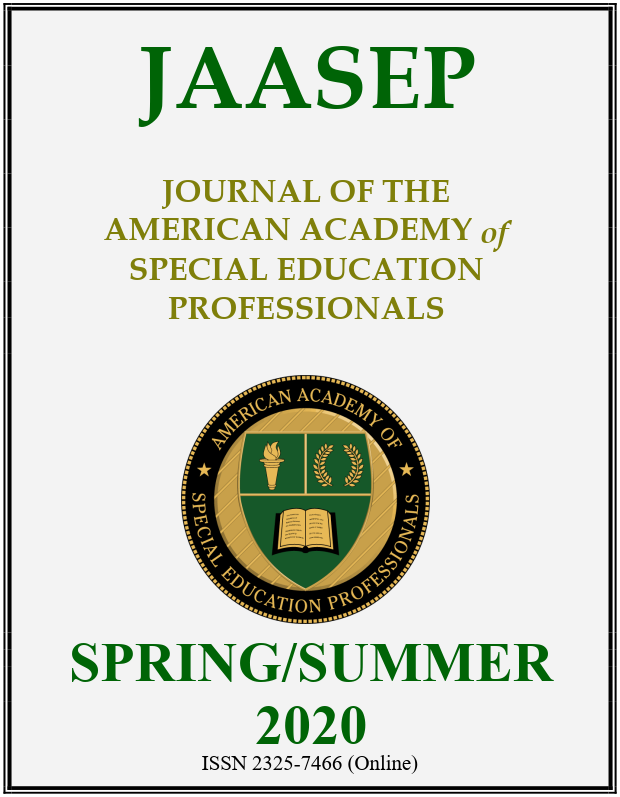Individual Education Plan Considerations for Online Learning: Accommodations
About Universal Design for Learning. (2018, January 25). Retrieved August 02, 2018, from http://www.cast.org/our-work/about-udl.html
Burns, Edward. Developing and Implementing IDEA-IEPs: An Individualized Education Program (IEP) Handbook for Meeting Individuals with Disabilities Education Act (IDEA) Requirements. C.C. Thomas, 2001.
Carter, R. A., & Rice, M. F. (2016). Administrator Work in Leveraging Technologies for Students With Disabilities in Online Coursework. Journal of Special Education Technology, 31(3), 137-146. doi:10.1177/0162643416660838. DOI: https://doi.org/10.1177/0162643416660838
Center on Online Learning and Students with Disabilities (2016). Equity matters: Digital & Online Learning for Students with Disabilities. Lawrence, KS: Author.
Equity Matters: Digital & Online Learning for Students with Disabilities (Publication). (2015). Center on Online Learning and Students with Disabilities. Every Student Succeeds Act of 2015, Pub. L. No. 114-95, § 114-95, 1177 (2015-2016).
Gambino, S. Salvatore. gambino@farmingdale. ed. (2006). Applications for Concurrent Synchronous and Asynchronous Communications in Distance Learning Environments. Journal of Instruction Delivery Systems, 20(4), 18–22.
Hashey, A. I., & Stahl, S. (2014). Making Online Learning Accessible for Students With Disabilities. Teaching Exceptional Children, 46(5), 70-78 doi:10.1177/0040059914528329. DOI: https://doi.org/10.1177/0040059914528329
Hofmann, M., Fehlinger, T., Stenzel, N., & Rief, W. (2015). The Relationship Between Skill Deficits and Disability-A Transdiagnostic Study. Journal of Clinical Psychology, 71(4), 413–421. https://doi.org/10.1002/jclp.22156 DOI: https://doi.org/10.1002/jclp.22156
Individuals with Disabilities Education Act, Pub. L. No. 20, § 1400 (2004).
Nowak, K. L., Watt, J., & Walther, J. B. (2017). The Influence of Synchrony and Sensory Modality on the Person Perception Process in Computer-Mediated Groups (Vol. 10, Ser. 3, Tech. No. JMC1038). Journal of Computer-Mediated Communication. doi:https://doi.org/10.1111/j.1083-6101.2005.tb00251.x. DOI: https://doi.org/10.1111/j.1083-6101.2005.tb00251.x
Rice, M., East, T., & Mellard, D. F. (2015). Report Number 3. In Superintendent Forum Proceedings (pp. 1-11). University of Kansas, KS: Center for Online Learning and Students with Disabilities. Retrieved November 30, 2017.
Rice, M. F., & Carter, J. R. (2015). “When We Talk About Compliance, It's Because We Lived It”-Online Educators Roles in Supporting Students with Disabilities. Online Learning. 19(5). doi:10.24059/olj.v19i5.581. DOI: https://doi.org/10.24059/olj.v19i5.581
Smith, S. (2016). Invited In Measuring UDL in Online Learning (pp. 1-54, Publication). KS: Center on Online Learning and Students with Disabilities. Tindle, K., East, B., & Mellard, D. (2017, April). Online Learning for Students with Disabilities: Considerations for LEA Policies, Practices, and Procedures. Retrieved November 21, 2017, from:http://www.centerononlinelearning.res.ku.edu/wp-content/uploads/2017/05/LEA_ResourceDoc_April2017.pdf.
Universal Design for Learning: Creating a Learning Environment that Challenges and Engages All Students [Professional Development]. (2017). IRIS Center Peabody College Vanderbilt University, Nashville, TN. “Voluntary Product Accessibility Template (VPAT).” Voluntary Product Accessibility Template (VPAT) | Section508.Gov, US General Services Administration, Apr. 2018, www.section508.gov/sell/vpat.
Worthen, M. (2016). The Future of Personalized Learning for Students with Disabilities. The Standard, (September), 35-44. Retrieved December 1, 2017, from http://www.nasbe.org/wp-content/uploads/Future-of-Personalized-Learning-for-Students-with-Disabilities_September-2016-Standard.pdf.
Yesilada, Y., Brajnik, G., Vigo, M., & Harper, S. (2012). Understanding web accessibility and its drivers, Proceedings of the International Cross-Disciplinary Conference on Web Accessibility W4A. Aarhus, Denmark: ACM Press. doi:10.1145/2207016.2207027. DOI: https://doi.org/10.1145/2207016.2207027
Downloads
Article Information
- Article Type Articles
- Submitted May 12, 2020
- Published June 15, 2020
- Issue Spring/Summer 2020
- Section Articles
